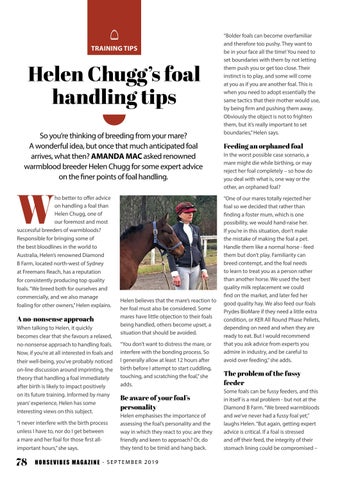TRAINING TIPS
Helen Chugg’s foal handling tips So you’re thinking of breeding from your mare? A wonderful idea, but once that much anticipated foal arrives, what then? AMANDA MAC asked renowned warmblood breeder Helen Chugg for some expert advice on the finer points of foal handling.
W
ho better to offer advice on handling a foal than Helen Chugg, one of our foremost and most successful breeders of warmbloods? Responsible for bringing some of the best bloodlines in the world to Australia, Helen’s renowned Diamond B Farm, located north-west of Sydney at Freemans Reach, has a reputation for consistently producing top quality foals. “We breed both for ourselves and commercially, and we also manage foaling for other owners,” Helen explains.
A no-nonsense approach When talking to Helen, it quickly becomes clear that she favours a relaxed, no-nonsense approach to handling foals. Now, if you’re at all interested in foals and their well-being, you’ve probably noticed on-line discussion around imprinting, the theory that handling a foal immediately after birth is likely to impact positively on its future training. Informed by many years’ experience, Helen has some interesting views on this subject. “I never interfere with the birth process unless I have to, nor do I get between a mare and her foal for those first allimportant hours,” she says.
78
Helen believes that the mare’s reaction to her foal must also be considered. Some mares have little objection to their foals being handled, others become upset, a situation that should be avoided. “You don’t want to distress the mare, or interfere with the bonding process. So I generally allow at least 12 hours after birth before I attempt to start cuddling, touching, and scratching the foal,” she adds.
Be aware of your foal’s personality Helen emphasises the importance of assessing the foal’s personality and the way in which they react to you: are they friendly and keen to approach? Or, do they tend to be timid and hang back.
HORSEVIBES MAGAZINE - SEPTEMBER 2019
“Bolder foals can become overfamiliar and therefore too pushy. They want to be in your face all the time! You need to set boundaries with them by not letting them push you or get too close. Their instinct is to play, and some will come at you as if you are another foal. This is when you need to adopt essentially the same tactics that their mother would use, by being firm and pushing them away. Obviously the object is not to frighten them, but it’s really important to set boundaries,” Helen says.
Feeding an orphaned foal In the worst possible case scenario, a mare might die while birthing, or may reject her foal completely – so how do you deal with what is, one way or the other, an orphaned foal? “One of our mares totally rejected her foal so we decided that rather than finding a foster mum, which is one possibility, we would hand-raise her. If you’re in this situation, don’t make the mistake of making the foal a pet. Handle them like a normal horse - feed them but don’t play. Familiarity can breed contempt, and the foal needs to learn to treat you as a person rather than another horse. We used the best quality milk replacement we could find on the market, and later fed her good quality hay. We also feed our foals Prydes BioMare if they need a little extra condition, or KER All Round Phase Pellets, depending on need and when they are ready to eat. But I would recommend that you ask advice from experts you admire in industry, and be careful to avoid over feeding,” she adds.
The problem of the fussy feeder Some foals can be fussy feeders, and this in itself is a real problem - but not at the Diamond B Farm. “We breed warmbloods and we’ve never had a fussy foal yet,” laughs Helen. “But again, getting expert advice is critical. If a foal is stressed and off their feed, the integrity of their stomach lining could be compromised –

















